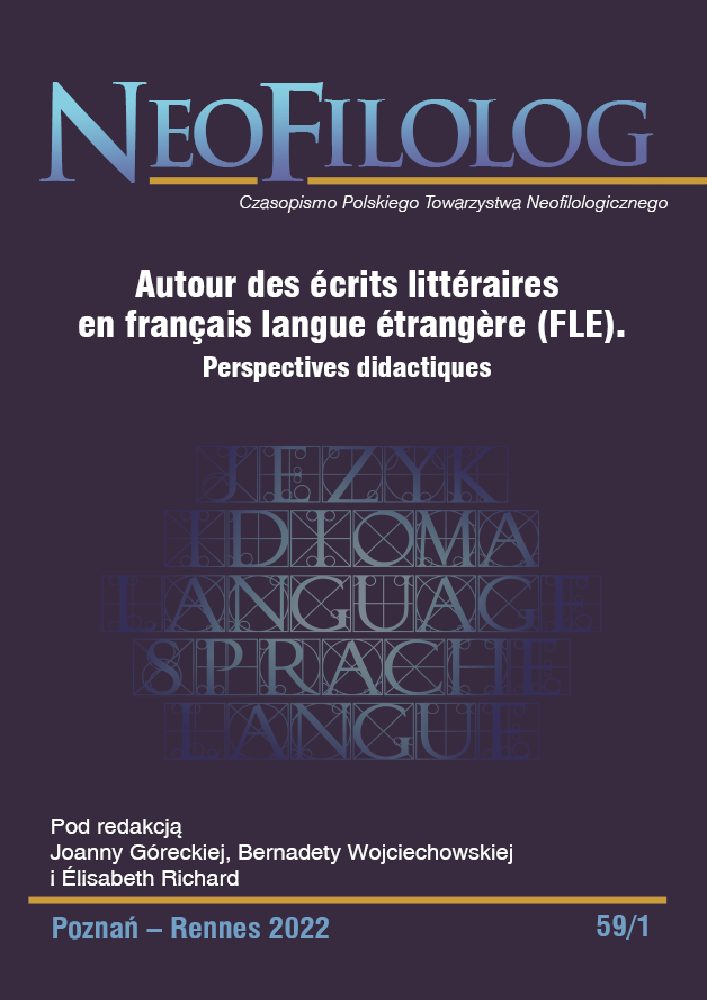Abstrakt
The aim of the article is to present the theoretical foundations underlying our didactic work, part of the European project DECLAME’FLE, and its objectives. The proposed reflection concerns the possibility of developing reading practices in FL among readers who are learners of French as a foreign language. The chosen approach exploits the concept of so-called literary reading, oriented towards a theoretical-aesthetic analysis of the text. In the school context, this analysis and interpretation is usually done in dialogue with other readers. However, in the case of personal reading, the reader-learner chooses their texts freely and is not supervised in the activity. We argue that media resources can be an effectively used by learners in their reading and in the analytical and reflective tasks that follow. Based on observation categories from discourse analysis and with reference to research on literary reading, we propose exercises for (future) teachers of French as a foreign language. Their aim is to model the reading of journalist and popular critical discourse in order to draw information from it about the book, the author and the presence of the book in the public space, observe the discourse strategies used and integrate them, in order to be able to talk about reading experiences and make presentations of appreciation of texts.
Bibliografia
Charaudeau P. (1988), La critique cinématographique : faire voir et faire parler, (in :) Charaudeau P. (dir.), La presse : produit, production, réception. Paris : Didier Érudition, 47-70.
De Croix S., Ledur D. (2001), Compétences de lecture littéraire : analyse des pratiques des élèves et propositions d'activités, (in :) Collès L., Dufays J.-L., Fabry G. et Maeder C. (dir.), « Didactique des langues romanes. Le développement des compétences chez l'apprenant. Actes du colloque de Louvain-la-Neuve ». Bruxelles : De Boeck Duculot, 252-258.
Dufays J.-L. (1997), Lire au pluriel. Pour une didactique de la diversité à l'usage des 14-15 ans. « Pratiques : linguistique, littérature, didactique », n° 95, 31-52. https://doi.org/10.3406/prati.1997.1812
Dufays J.-L. (2013), Sujet lecteur et lecture littéraire : quelles modélisations pour quels enjeux ? « Recherches & Travaux », n° 83, 77-88. En ligne : https:// journals.openedition.org/recherchestravaux/666 [consulté 01.04.2022]. https://doi.org/10.4000/recherchestravaux.666
Dufays J.-L. (2019), Comment évalue-t-on les textes littéraires ? « Recherches & Travaux », n° 94, 1-13. En ligne : https://journals.openedition.org/recherchestravaux/1605 [consulté 01.04.2022]. https://doi.org/10.4000/recherchestravaux.1605
Dufays J.-L., Gemenne L., Ledur D. (2005), Pour une lecture littéraire. Bruxelles : Éditions De Bœck Université. https://doi.org/10.3917/dbu.dufay.2005.01
Dufays J.-L., Lisse M., Meurée C. (2009), Théorie de la littérature. Une introduc-tion. Louvain-la-Neuve : Bruylant-Academia.
Falardeau E. (2003), Compréhension et interprétation : deux composantes com-plémentaires de la lecture littéraire. « Revue des sciences de l'éducation », n° 29 (3), 673-694. https://doi.org/10.7202/011409ar
Godard A. (dir.), (2015), La littérature dans l'enseignement du FLE. Paris : Didier.
Górecka J., Orchowska O. (2020), Préparer les apprenants polonais de FLE à la lecture de la littérature francophone. Réflexion didactologique sur l'exploitation des critiques littéraires au niveau B2. « Revue internatio-nale MÉTHODAL » n° 4, 85-107. En ligne : https://methodal.net/spip.php?page=article&id_article=269 [consulté 01.04.2022]
Laborde-Milaa I., Temmar M. (2008), La figure de l'écrivain dans la critique littéraire médiatique. « Semen », n° 26. En ligne : http://journals.openedition.org/semen/8433 [consulté 01.04.2022]. https://doi.org/10.4000/semen.8433
Lebrun M. (1997), De la nécessité de toucher aux textes dits littéraires en classe de langue seconde ou étrangère, (in :) Conférence dans le cadre du XVIe congrès international des linguistes tenu à Paris du 20 au 25 juillet 1997. Texte paru dans les Actes sur CD ROM Proceedings of the 16th Interna-tional Congress of Linguists. Pergamon : Oxford.
Leclaire-Halté, A. (2006), Lecture formelle ou participative ? « Lidil », n° 33, 1-13. https://doi.org/10.4000/lidil.66
Legallois D., Poudat C. (2008), Comment parler des livres que l'on a lus ? Dis-cours et axiologie des avis des internautes. « Semen », n° 26. En ligne : http://journals.openedition.org/semen/8444 [consulté 01.04.2022]. https://doi.org/10.4000/semen.8444
Picard M. (1986), La lecture comme jeu. Paris : Minuit.
Puren Ch. (2014), Textes littéraires et logiques documentaires en didactique des langues-cultures, « Le langage et l'homme », n° XLIX.1, 127-137. En ligne : https://www.christianpuren.com/mes-travaux/2014g/
Richard S. (2006), Former un sujet-lecteur au secondaire. « Québec français », n° 143, 76-77. En ligne : https://www.erudit.org/fr/revues/qf/2006-n14 3-qf1179170/49500ac [consulté 01.04.2022].
Riquois E. (2010), Acquérir une compétence lectoriale en francais langue étran-gère et seconde », (in :) Neveu F., Muni Toke V., Durand J., Klingler T., Mondada L. (dir.), Cogrès Mondial de Linguistique Francaise-CMLF 2010. Paris : Institut de Linguistique Française, 595-607. https://doi.org/10.1051/cmlf/2010236
Roch-Veiras S. (2013), Comprendre un texte en langue étrangère : une question d'émotions …. « Lidil », n° 48. En ligne : https://journals.openedition.org/lidil/3319 [consulté 01.04.2022]. https://doi.org/10.4000/lidil.3319
Rouxel A. (2007), Pratiques de lecture : quelles voies pour favoriser l'expression du sujet lecteur ? « Le français aujourd'hui », n° 157 (2), 65-73. https://doi.org/10.3917/lfa.157.0065
Tauveron C. (1999), Comprendre et interpréter le littéraire à l'école : du texte réticent au texte proliférant. « Repères », n° 19, 9-38. https://doi.org/10.3406/reper.1999.2289
Turgeon E. (2006), Apprécier des œuvres littéraires : mission possible ! « Qué-bec français », n° 143, 57-59. En ligne : https://www.erudit.org/fr/revues/qf/2006-n143-qf1179170/49493ac.pdf [consulté 01.04.2022].
Wojciechowska B., Górecka J. (2021), Literatura frankofońska o migracji i wygnaniu na lekcji języka francuskiego. Projekt Erasmus + DECLA-ME'FLE. « Języki Obce w Szkole », n° 4, 19-27. En ligne : https://jows.pl/artykuly/literatura-frankofonska-o-migracji-i-wygnaniu-na-zajeciach-z-jezyka-francuskiego-perspektywa-dysku
Wojciechowska, B. (à paraître), « Littérature francophone de migration et d'exil - quelle approche de lecture pour développer les compétences intercul-turelles en FLE », Romanica Wratisalviensia 69.
Licencja
Prawa autorskie (c) 2022 Joanna Górecka

Utwór dostępny jest na licencji Creative Commons Uznanie autorstwa – Bez utworów zależnych 4.0 Międzynarodowe.
Przedstawiany utwór (artykuł) upubliczniany jest na podstawie umowy z autorem i na licencji Creative Commons Attribution-NoDerivatives 4.0 International (CC BY-ND 4.0).
Użytkownicy mają obowiązek podania wraz z rozpowszechnionym utworem, informacji o autorstwie, tytule, źródle (odnośniki do oryginalnego utworu, DOI) oraz samej licencji;
- bez tworzenia utworów zależnych,
- utwór musi być zachowany w oryginalnej postaci.
Uniwersytet im. Adama Mickiewicza w Poznaniu zachowuje prawo do czasopisma jako całości (układ, forma graficzna, tytuł, projekt okładki, logo itp.).

